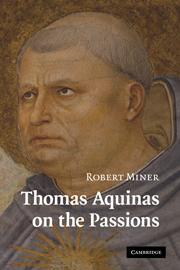Book contents
- Frontmatter
- Contents
- List of figures
- List of tables
- Acknowledgments
- A note on the texts
- Introduction
- Part 1 THE PASSIONS IN GENERAL
- 1 The sensitive appetite
- 2 The definition of passion
- 3 The activation of passion
- 4 The morality of the passions
- Part 2 PARTICULAR PASSIONS: THE CONCUPISCIBLE PASSIONS
- Part 3 PARTICULAR PASSIONS: THE IRASCIBLE PASSIONS
- Bibliography
- Index
3 - The activation of passion
Published online by Cambridge University Press: 06 July 2009
- Frontmatter
- Contents
- List of figures
- List of tables
- Acknowledgments
- A note on the texts
- Introduction
- Part 1 THE PASSIONS IN GENERAL
- 1 The sensitive appetite
- 2 The definition of passion
- 3 The activation of passion
- 4 The morality of the passions
- Part 2 PARTICULAR PASSIONS: THE CONCUPISCIBLE PASSIONS
- Part 3 PARTICULAR PASSIONS: THE IRASCIBLE PASSIONS
- Bibliography
- Index
Summary
Because the passions are “passive potencies” in Aristotle's sense, they remain inert unless they are activated by an agent outside themselves. What activates the passions? Since appetite follows apprehension, certain types of sensation, imagination, and perception will reliably activate certain passions. Here what matters is not the particular object of perception, but the “form” or “aspect” under which that object is perceived. This is the “formal object” of the passion. While the formal object activates the passion, it must be distinguished from the “material” or “dispositive” cause of the passion (§3.1). The apprehension of a singular concrete object by sensation or imagination plays a crucial role in the activation of the sensitive appetite (§3.2). But is sensitive apprehension the only act relevant for understanding the activation of passion? In rational animals, the sensitive soul is influenced to no small degree by the intellect. Careful attention must be paid not only to sensation and imagination, but also to the “estimative power” and “memorative power” in non-rational animals (§3.3), which in human beings assumes the form of the “cogitative power,” also known as the “particular reason” (§3.4). What else would activate the passions? Because the passions are intrinisically related to one another, Aquinas holds that some passions reliably cause other passions, in a set of predictable sequences (§3.5).
FORMAL OBJECTS OF THE PASSIONS
A passion is an act of the sensitive appetite. Such acts are properly “passive” because they require something outside themselves to activate them.
- Type
- Chapter
- Information
- Thomas Aquinas on the PassionsA Study of Summa Theologiae, 1a2ae 22–48, pp. 58 - 87Publisher: Cambridge University PressPrint publication year: 2009

